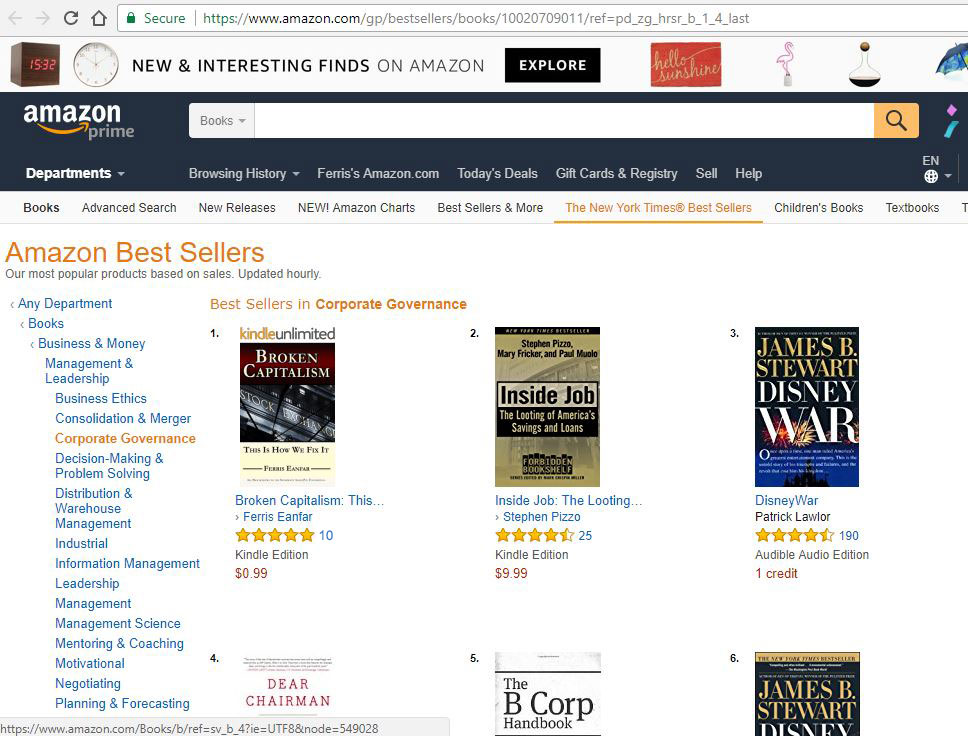Economic Models Collapse in the Real World. Economic neoliberalism is a theoretical economic framework that many academics and political and business leaders like to promote because it performs well inside clean-room laboratory conditions (i.e., economic models).1 Some people embrace these models in good faith; others use them strategically to manipulate and deceive. Regardless, in the real world, most macroeconomic models break down because of special interest influences on the political implementation and enforcement of economic policies and industry regulations.
Rapid Global Wealth Transfers Do Not Occur Spontaneously. One thing that is rarely discussed among cheerleaders neoliberalism is the fact that “comparative advantage” is not why Far Eastern countries have dominated the West in manufacturing over the past few decades. In reality, the massive transfer of wealth from West to East did not just happen spontaneously through the natural market mechanism of supply and demand. It was promoted relentlessly and instigated aggressively by American corporate executives and politicians who were seeking to increase their profits and political power by eliminating their domestic labor forces.
The Mechanics of a Rapid Global Wealth Transfer. To accomplish that, they invested many billions of dollars into foreign manufacturing capacity, providing technical assistance, intellectual property, valuable training, deeply discounted loans, distorted government regulations, political campaign funding to pro-corporatist politicians, and other sources of value and propaganda to help launch offshore manufacturing facilities. This was a tremendous, multi-decade campaign that could not have been accomplished without persistent and highly self-interested American corporate executives and politicians. (Of course, corporations and politicians in other Western countries jumped on the gravy train, too, after they saw what the Americans were doing.)
China Cheated, But That’s Only Half the Story. Until the 1980s, the U.S. had the most productive labor force on the planet. Virtually nobody could compete with American labor in most manufacturing industries. But by aggressively transferring their expertise, capital, and other forms of value to the East, American corporations essentially forced China to rapidly industrialize and cannibalize the American labor force. That enabled American corporate executives and politicians to rapidly eliminate the American labor force’s share of American profits and power while blaming it on the “cheating Chinese”. Thus, a relatively tiny number of people became rich and politically powerful by exploiting and subsidizing Eastern sweatshops and flaccidly responding to China’s egregious WTO violations, which have included currency manipulation, unauthorized quotas, government subsidies, widespread and systemic intellectual property theft, etc.
Missing Good-Faith Business and Political Leadership. For generations, American policymakers and business leaders have been well aware that their economic and labor policies would be disastrous for the U.S. economy. Instead of preserving America’s leadership as the most productive labor force in the world, they chose the self-serving path, which channeled profits and political power into the hands of a very small number of people at the expense of the entire American labor force and economy.
Wars and Corporatist Economic Policies Are Always Sold Based on Lies and Half-Truths. At every step of America’s descent into its current economic swamp, there were specific economic policies that should have been implemented and specific public statements that American political leaders should have clearly and unanimously communicated to the American business community and general public. Just like the wars in Vietnam, Iraq, and others around globe, if American political leaders would have been honest with the American people about the true consequences of economic liberalism-mutated-into-unabashed-corporatism, the American people would have never gone along with it.
Corporate Loyalty to Country is a Prerequisite for Socioeconomic Stability. Historically, the only other country that had equivalent or better labor productivity than the U.S. was Japan, but for cultural reasons, Japanese corporations never sold out their own people. Rather, Japanese corporations have always been committed to nurturing their manufacturing at home while simultaneously creating the highest quality of life for their own people. The Japanese economy ran out of gas in the late 1990s due to over-leveraged corporate and government balance sheets and demographic limitations, but this was not because they refused to cannibalize their own labor force like American business and political leaders. To the contrary, Japanese corporations have supported their domestic labor force even through the most difficult times. As a result, Japanese society is far more stable and more evenly prosperous than American society.
Corporate Co-Determination is Part of the Solution. Between the late 1970s and 2000, American corporations and politicians had a choice: (a) destroy the American labor force to squeeze more profits and political power into fewer hands or (b) implement the policy of “co-determination” (as adopted in Germany), which would have given American corporations meaningful economic and political incentives to support American labor and the U.S. economy. Co-determination fundamentally aligns the incentives of corporate shareholders, executives, and their labor forces so that all stakeholders are genuinely incentivized to work together in good faith to increase their productivity and share the rewards from their mutual success. And it would substantially resolve the escalating wealth distribution and labor force participation problems associated to automation within the U.S. domestic economy. Without mandatory corporate governance policies like co-determination, there is no incentive for shareholders and management to truly care about their labor force or the broader domestic economy.
Missing Rational Economic and Labor Policies. A combination of federal fiscal accountability, rational monetary policy (i.e., attractive interest rates to nurture savings, capital investment and the avoidance of moral hazard-inducing bailouts), rational corporate governance like Germany’s co-determination policy, along with a more competitive corporate tax regime like Switzerland’s would have ensured that American manufacturing remained the most efficient in the world. With rational economic and labor policies, even the sweatshops in the Far East would not have been able to match American technological prowess and productivity. And without American corporate largesse, the Eastern sweatshops never would have obtained enough capital, expertise, technology, and infrastructure to destroy the socioeconomic heart of the United States.
Transnational Cannibalism. For those who are not U.S. Citizens or not particularly loyal to the U.S., you should know that transnational cannibalism is coming for you, too. This same process will repeat itself in virtually every country until and unless economic policymakers in each country learn from America’s mistakes. The concentration of wealth and political power into the hands of a tiny number of people is tearing apart the socioeconomic fabric of nations worldwide and driving governments toward statist models of governance that will strip the dignity, liberty and wealth from their citizens. This is the same dynamic that inspired the Bolshevik Revolution in Russia in 1917, which ushered in an unprecedented era of brutal government oppression in the name of human rights.
Rising Out of Poverty; Descending into Slavery and Sorrow. Governments commit their greatest atrocities when their citizens have been stripped of their economic and political liberties. Sadly, that is what is happening today all over the world. Billions of people are rising out of poverty, but they are descending into modern slavery while transnational cannibals sell them garbage products and policies that consume their bodies, minds, and souls. This is leading to a dystopian world that few people can imagine today, but our children and their children won’t need to imagine it; they will be trapped in it. And they will despise us for it.
1. Learn more about the difference between classical liberalism and neoliberalism.
About Ferris Eanfar
Ferris Eanfar has over 20 years of experience in technical, financial, media, and government intelligence environments. He has written dozens of articles and several books in the fields of Economics, Crypto-Economics, and International Political Economy, including Broken Capitalism: This Is How We Fix It and GINI: Capitalism, Cryptocurrencies & the Battle for Human Rights and the Global Governance Scorecard. Ferris is a cofounder of the Gini Foundation, which builds unique cryptocurrency systems to protect human rights, among other benefits; and the CEO of the AngelPay Foundation, a nonprofit financial services company with a mission to “return wealth and power to the creators of value.” To learn more about Ferris, please visit the About Ferris page.Visit Ferris on:

 Gini Website Coming Soon. We (
Gini Website Coming Soon. We (
